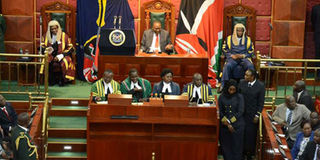Needed: National covenant between Kenyans and God

President Uhuru Kenyatta during the State of the Nation address to a joint session of Parliament in the National Assembly on March 31, 2016. Why shouldn’t we then give form and content to the President’s call in his State of the Nation speech for a national covenant. PHOTO | RAPHAEL NJOROGE | NATION MEDIA GROUP
What you need to know:
- Could it be that we need that national covenant between the people of Kenya and God, to make our Constitution’s promises come to fruition?
- Will a spiritually led national covenant in which the civic leaders and civic polity (the rest of us) swear before God and themselves to live in good order, conduct themselves with virtue, and combine to form a people called Kenyan finally allow us to realise the elusive goal of the Kenyan nation and people?
- We can only find the answers to these questions if we choose this path, and since we have nothing to lose, why shouldn’t we then give form and content to the President’s call in his State of the Nation speech for a national covenant in this manner?
When the Pilgrims left England to go find a new colony in America, they thought it necessary to first covenant together on how this colony would be brought into being and run.
So on 11th November 1620, upon the Mayflower, all male adult passengers signed what came to be known as the Mayflower Compact, in which they solemnly and in the presence of God and one another covenanted to form into a civil body politic that would run the affairs of the new colony.
By covenanting to create a civic culture in which the laws, regulations and institutions governing politics would be for the general good, is probably safe to say the subsequent seminal documents in the formation of the American nation and people, namely the Declaration of Independence in 1776, the Articles of Confederation in 1781 and the Constitution of the United States in 1789, derived some of their being and values from the Mayflower Compact of 1620.
While we in Kenya have had the Lancaster Constitution and now the Constitution of Kenya 2010, we have probably never covenanted to one another and before God to become one nation.
Yes, we have the preamble in our current Constitution, we have the National Anthem, and we have the flag, and all the institutions of a modern state, but do we have the DNA of a nation that constantly pursues the ideal, generation after generation, to form a Kenyan nation and people, out of the diverse peoples and nationalities in the state?
The answer is both yes and no. When Kenyans or people of Kenyan descent win big anywhere in the world, in sports, in politics, in science, and in any other endeavour, we become one people, united in pride and joy.
But that dissipates quickly, and soon, the ephemeral bonds that bound us during the euphoric moments are replaced by the enduring cleavages that want to tightly circumscribe and separate us by tribe, gender, race, religion and region.
DISCRIMINATION
One could argue that despite the covenant, America did not treat its slaves well, and even after the end of slavery, it discriminated actively against the blacks for a century before the civil rights movement gained them freedom and acceptance as equal citizens.
One could further say that minorities are still not fully integrated. And yet, even with all these shortcomings, all Americans seem to have a clear identity as Americans.
So then, what could make our nascent sense of nationhood stronger? Could a national covenant between all our various nationalities, races, and people before God do so?
Could such a solemn vow to create one people and one nation held together by common values and virtues, and built on a commonly agreed civic culture, give us that national DNA we are all seeking?
Could it be that in doing so, we will be affirming the current Constitution and what progress our journey of 53 years as an independent nation has wrought thus far?
Some may argue the promulgation of the Constitution on August 27, 2010 suffices, and it was a civic national covenant of sorts, witnessed by the world and celebrated with the national holiday and all kinds of monuments.
So what would yet another covenant achieve compared to what the promulgation has realised so far?
ELEMENT OF SPIRITUALITY
My answer to these objections is that it seems to me that to become a real nation, there is an element of spirituality that characterises the deep connection individuals and communities have with their national identity.
It may be pure civic and secular type spirituality as in the case of France, with regard to the Republic, the French language and culture, and the essence of being French.
In the American case, there is civic and religious spirituality to being American. So while the promulgation did serve the civic element for Kenya, did we miss the spiritual element in this deeply religious country?
Could it be that we need that national covenant between the people of Kenya and God, to make our Constitution’s promises come to fruition?
Will a spiritually led national covenant in which the civic leaders and civic polity (the rest of us) swear before God and themselves to live in good order, conduct themselves with virtue, and combine to form a people called Kenyan finally allow us to realise the elusive goal of the Kenyan nation and people?
We can only find the answers to these questions if we choose this path, and since we have nothing to lose, why shouldn’t we then give form and content to the President’s call in his State of the Nation speech for a national covenant in this manner?
Sam Mwale is a commentator on economic and public policy issues.




